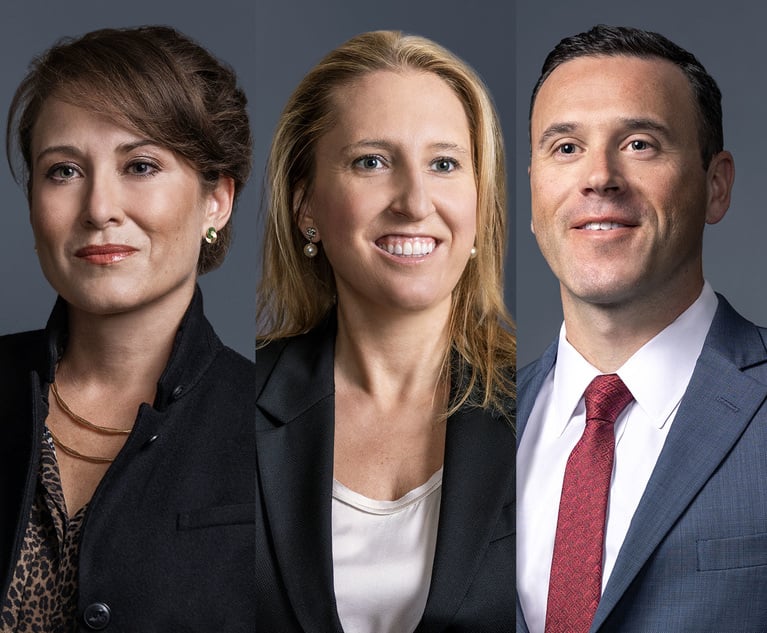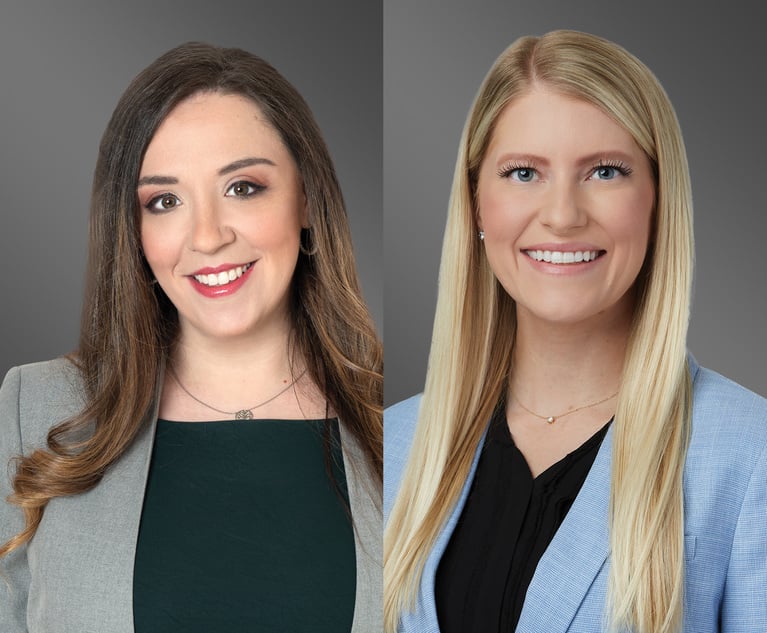Court Finds State's Drought Efforts Violated Jurisdiction and Due Process
Water districts secured a win in the first stage of challenges to curtailments.
March 26, 2018 at 11:58 AM
5 minute read

It is no secret that the State of California was tasked with handling one of the worst droughts in California's recorded history. In 2015, a group of several irrigation districts and water agencies (Public Agencies) located in the Delta challenged how the State curtailed water users during the drought and, after years of litigation, recently obtained victory in Santa Clara Superior Court. The decision protects water right holders by requiring the State Water Resources Control Board (Water Board) to provide due process protections before requiring California water rights holders to stop lawful water diversions.
The case began when the Water Board issued written notices to large groups of water diverters in the Sacramento-San Joaquin River and Delta watersheds, requiring the diverters to immediately stop diverting water and report to the Water Board when they stopped diverting water. No due process hearings were conducted prior to issuing these notices. Thus, when they received the notice, diverters faced two choices: (1) comply and stop diverting water, causing harm to their residential, commercial and agricultural customers; or (2) defy the notice and risk substantial administrative penalties for every day of diversion. Initially baffled by notices, some Public Agencies decided to continue diverting, some stopped diverting and, if available, purchased water from other sources, and some complied and ceased diversions.
Ultimately responding to the notices, several Public Agencies filed separate civil suits against the Water Board in various superior courts in Northern California counties. Shortly after these suits were filed and served, the Water Board issued administrative proceedings against two Public Agencies that sued the Water Board—the Byron-Bethany Irrigation District (BBID) and the West Side Irrigation District (WSID). In March 2016, BBID and WSID, joined by several other water agencies, defended themselves before the Water Board (the same agency that issued the notices) against a consolidated administrative enforcement proceeding. In an unprecedented decision, the Water Board's hearing team determined that the Water Board's own staff members failed to present sufficient evidence to carry its prosecutorial burden of proof. Both administrative actions were dismissed.
In the meantime, the lawsuits filed by the Public Agencies were coordinated as the California Water Curtailment Cases and transferred to the complex litigation division of the Santa Clara County Superior Court. After several rounds of demurrers, the parties agreed to separate trial of the issues into three phases. Phase 1 addressed whether the Water Board had the jurisdiction to issue curtailment notices to the most senior water right holders in the state and whether the Water Board provided the required due process to all water right holders who received the notices.
The superior court heard oral arguments for Phase 1 in January 2018 and issued its decision within a month. Reviewing the issues de novo, the court issued decisions on multiple topics including standing and administrative law issues, but the decisions primarily focused on the extent of the Water Board's jurisdiction to curtail and whether the curtailment notices violated due process.
Regarding jurisdiction, the court determined that the Water Board did not have the authority to curtail pre-1914 and riparian water right holders, the most senior water right holders in the state. The decision is limited to circumstances under which the Water Board curtails these senior water right holders under Water Code section 1052, which provides that diverting water is a trespass except as authorized by the water permitting and licensing statutes in Division 2 of the Code. Pre-1914 and riparian water right holders are not subject to the permitting and licensing requirements under Division 2. The court viewed the Water Board's argument as an improper attempt to expand its own jurisdiction without legislative approval. The court emphasized that the Water Board's actions must be authorized by some statutory foundation. Because no statute supported the Water Board's actions, the court found that the Water Board did not have the authority to curtail pre-1914 and riparian water right holders under the trespass provision.
Regarding due process, the Public Agencies argued that the curtailment notices violated their constitutional due process rights by curtailing diversions without first providing a hearing or other opportunity to challenge the Water Board's decisions and actions. The Water Board characterized the curtailment notices as informational, but the court focused on the notices' order to immediately stop diverting water or risk large administrative penalties—like the more than $5 million threatened against BBID. The Water Board's failure to provide any due process resulted in the court holding that the Water Board violated due process requirements and that the Water Board must provide an opportunity for those who receive such a notice to challenge the stated findings before curtailments are implemented and fines are issued.
While the court announced its decision to issue the writs requested by the Public Agencies, the writ will not issue until completion of Phases 2 and 3, which involve other constitutional claims and a takings claim. Since 2015, the Water Board has not issued curtailment notices. However, the court's decision provides that the Water Board must find a different method for implementing curtailments, and it will be required to provide heightened due process opportunities to water right holders it seeks to curtail.
Lauren D. Bernadett, an associate with Somach Simmons & Dunn in Sacramento, Calif., is a natural resources lawyer who has counseled private and public clients through administrative processes and litigation in state and federal courts. She can be reached at [email protected].
Michael E. Vergara, a shareholder with the firm, serves as outside litigation and general counsel to businesses and public entities that have environmental law issues. He can be reached at [email protected].
This content has been archived. It is available through our partners, LexisNexis® and Bloomberg Law.
To view this content, please continue to their sites.
Not a Lexis Subscriber?
Subscribe Now
Not a Bloomberg Law Subscriber?
Subscribe Now
NOT FOR REPRINT
© 2025 ALM Global, LLC, All Rights Reserved. Request academic re-use from www.copyright.com. All other uses, submit a request to [email protected]. For more information visit Asset & Logo Licensing.
You Might Like
View All
M&A Transactions and AB 1824: Navigating New Privacy Compliance Challenges
7 minute read
What Will It Mean in California if New Federal Anti-SLAPP Legislation Passes?
9 minute readTrending Stories
- 1Uber Files RICO Suit Against Plaintiff-Side Firms Alleging Fraudulent Injury Claims
- 2The Law Firm Disrupted: Scrutinizing the Elephant More Than the Mouse
- 3Inherent Diminished Value Damages Unavailable to 3rd-Party Claimants, Court Says
- 4Pa. Defense Firm Sued by Client Over Ex-Eagles Player's $43.5M Med Mal Win
- 5Losses Mount at Morris Manning, but Departing Ex-Chair Stays Bullish About His Old Firm's Future
Who Got The Work
J. Brugh Lower of Gibbons has entered an appearance for industrial equipment supplier Devco Corporation in a pending trademark infringement lawsuit. The suit, accusing the defendant of selling knock-off Graco products, was filed Dec. 18 in New Jersey District Court by Rivkin Radler on behalf of Graco Inc. and Graco Minnesota. The case, assigned to U.S. District Judge Zahid N. Quraishi, is 3:24-cv-11294, Graco Inc. et al v. Devco Corporation.
Who Got The Work
Rebecca Maller-Stein and Kent A. Yalowitz of Arnold & Porter Kaye Scholer have entered their appearances for Hanaco Venture Capital and its executives, Lior Prosor and David Frankel, in a pending securities lawsuit. The action, filed on Dec. 24 in New York Southern District Court by Zell, Aron & Co. on behalf of Goldeneye Advisors, accuses the defendants of negligently and fraudulently managing the plaintiff's $1 million investment. The case, assigned to U.S. District Judge Vernon S. Broderick, is 1:24-cv-09918, Goldeneye Advisors, LLC v. Hanaco Venture Capital, Ltd. et al.
Who Got The Work
Attorneys from A&O Shearman has stepped in as defense counsel for Toronto-Dominion Bank and other defendants in a pending securities class action. The suit, filed Dec. 11 in New York Southern District Court by Bleichmar Fonti & Auld, accuses the defendants of concealing the bank's 'pervasive' deficiencies in regards to its compliance with the Bank Secrecy Act and the quality of its anti-money laundering controls. The case, assigned to U.S. District Judge Arun Subramanian, is 1:24-cv-09445, Gonzalez v. The Toronto-Dominion Bank et al.
Who Got The Work
Crown Castle International, a Pennsylvania company providing shared communications infrastructure, has turned to Luke D. Wolf of Gordon Rees Scully Mansukhani to fend off a pending breach-of-contract lawsuit. The court action, filed Nov. 25 in Michigan Eastern District Court by Hooper Hathaway PC on behalf of The Town Residences LLC, accuses Crown Castle of failing to transfer approximately $30,000 in utility payments from T-Mobile in breach of a roof-top lease and assignment agreement. The case, assigned to U.S. District Judge Susan K. Declercq, is 2:24-cv-13131, The Town Residences LLC v. T-Mobile US, Inc. et al.
Who Got The Work
Wilfred P. Coronato and Daniel M. Schwartz of McCarter & English have stepped in as defense counsel to Electrolux Home Products Inc. in a pending product liability lawsuit. The court action, filed Nov. 26 in New York Eastern District Court by Poulos Lopiccolo PC and Nagel Rice LLP on behalf of David Stern, alleges that the defendant's refrigerators’ drawers and shelving repeatedly break and fall apart within months after purchase. The case, assigned to U.S. District Judge Joan M. Azrack, is 2:24-cv-08204, Stern v. Electrolux Home Products, Inc.
Featured Firms
Law Offices of Gary Martin Hays & Associates, P.C.
(470) 294-1674
Law Offices of Mark E. Salomone
(857) 444-6468
Smith & Hassler
(713) 739-1250








